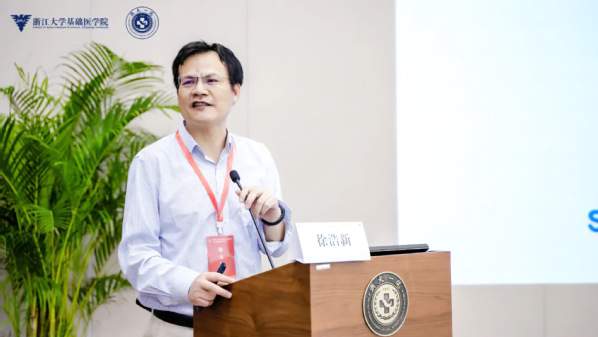XU Haoxin
Dean, School of Basic Medical Sciences,Zhejiang University
Qiushi Chair Professor of Zhejiang University
Professor of Liangzhu Lab
Visiting Professor,Department of Biology,University of Michigan
Presidential Early Career Award for Scientists and Engineers 2010
Researcher of the New Cornerstone Investigator Program 2023
President of the Zhejiang Society for Neuroscience

Q1: What made you decide to come to Zhejiang University?
XU: There are two things I considerfrequently:how to create somethingdifferent and to cultivate what kind ofindividuals.Zhejiang University has alarge scale and various disciplines and has the basic cross-disciplinary advantage. Zhejiang University has a lofty goal intalent training,there is consensus at alllevels,there is themotivation for reform, shows a great degree offlexibility, and in order to achieve this goal, everyoneis willing to work hard and determined. Because these are in line with my personal development and ambition,they are attractive enough for me,and thefutureis also worth looking forward to.
Q2: Could you brief us on your research area?
XU: My research focuses on ion channels, specifically those on lysosomes.Nearly 15%of the new FDA-approved drugs target ion channels.Lysosomes serveas waste-cleaning factories for cells,and their abnormal function are closely associated with neurodegenerativediseases, metabolic diseases,tumors, and aging.Lysosomal ion channelsplay an important role inregulating lysosomalfunctions.In the treatment of disease,finding the direct root cause of the disease is the way to cure the disease, while developing specific interventions to curb disease progression is also beneficial. Only by treating both the symptoms and the root cause of diseases, we can ultimately alleviate patients' suffering. That's why I chose lysosomes as my research object.
Q3: What are your plans regarding your future research?
XU: So far, the team has identified a total of 12 unknown ion channelproteins, including 8 lysosomal ion channel proteins, published a series of research results on the lysosomal ion channel TRPML1, established the physiological function of TRPML1, and proposed that TRPML1 channel is a potential target for the treatment of related diseases in a groundbreaking way. At present, the relevant research results have received the attention and investment of many large international pharmaceutical companies, and the conversion company has been established in the United States. In the future, the team will continue to work on lysosomal ion channels, but also expand the study to other organelles, and carry out translational studies on the other seven ion channels that have been discovered. My goal is that each of these ion channels will lead to the development of drugs to treat some of the most difficult diseases that have plagued mankind for a long time.
Q4: How will you achieve your dream?
XU: As a scientist, I will always keep introspective, and endeavor to make solid, innovative and convincing scientific achievements. As an educator, I want to cultivate the young scholars who have certain taste in scientific research, dare to ask critical questions and dare to ask sharp questions and dare to challenge scientific peaks, and build a cross-boundary and diversified platform for them. As the dean of the school, I will encourage innovation and put the innovation in the most important position, to create a tolerant and open growth environment for young people and encourage them to break through and always pursue excellence, and also create an inclusive and open environment for young scientists.